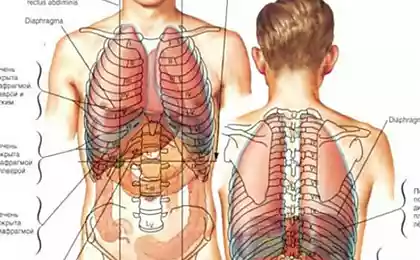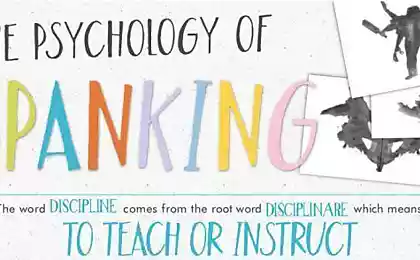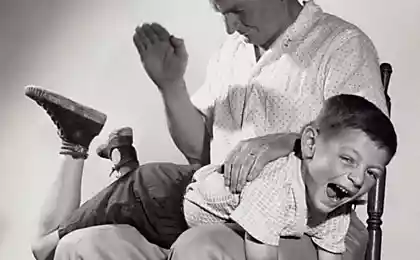583
Listen to your heart: how bodily sensations affect our emotions
Sixty million nine hundred thirty two thousand two hundred sixty two
© Shutterstock
Our decisions, mood, life satisfaction, the ability to empathize with other people and many other emotions are explained by certain cognitive processes. But what if it is not the brain, and heart? It has long been considered the center of the soul, and today's studies prove that the ability to listen to it directly affects the quality of our lives. T&P have translated an article by David Robson, included in the list of the best articles of 2014 BBC Future.
Almost every second Carlos (the hero's name changed — ed. ed.), felt weak punch in his stomach. It was the beating of his second heart. Carlos had a heart transplant, and his body appeared a little mehanicheskij pump, which helped to work his weak heart muscles. However, a new feeling he didn't like. It seemed that the pulsing mechanism replaced his own heart rate, distorted ideas about their body. While the device beat rhythm in the abdomen, Carlos never left an eerie feeling that his chest is now at the level of the abdomen.
The feeling was strange and disturbing. But neuroscientist Agustin Ibanez after a meeting with Carlos has made it even more strange assumptions. According to Ibanez, transplantation of the heart doctors also change the patient's mind: Carlos implant will now think, feel and act differently.
But how? We often use the expression "follow your heart", but only recently have scientists discovered that this phrase has a literal meaning. Tireless muscle really affect our emotions and inner sense of intuition. All the feelings from empathy to another person experiencing pain, to suspicions of infidelity of a spouse, can be born from subtle signals in your heart and the rest of the body. According to Ibanez from the University of Favaloro in Buenos Aires, a man that beats two hearts is a perfect opportunity to test this theory.
"Cranial stuffing"In the work Ibaneta vividly describes the many theories on the role of the heart in consciousness. This role, as is sometimes thought, were even more important role of the brain. For example, Aristotle, touching the wet gray matter, believed that the main function of the brain — cooling of passion coming from the heart where the soul lies. For the same reasons in ancient Egypt for embalming left heart in the chest, but he removed all the stuffing of the skull. Now the brain is a much more important place in scientific theories, although the heart is preserved as the source of our emotions. Remember all the metaphors that are used to describe feelings.
William James (William James), the founder of modern psychology in the nineteenth century suggested that emotions are actually a chain of reactions between the body and the brain. In accordance with his theory, the brain perceives a threat and responds to it reflexively: the heart beats faster, your palms sweat. On these grounds we understand that we face some danger. Therefore, the abstract concepts move on to specific internal experiences. Theory James also raises an important question: if we all have different body sensations, different emotions then? This theory was hard to believe, but today, a hundred years later, scientists have had the opportunity.
In the first experiment subjects were asked to calculate their heart rate based solely on the sensations inside the chest. They were not allowed to put a hand on the heart or measure the heart rate. Try it for yourself and you will see that it can be surprisingly challenging. About a quarter of a skips about 50% of strokes and almost no feeling of internal movement. And only a quarter can handle the task with an accuracy of 80%. After verification of the ability to perceive their own heart rhythm the researchers conducted with participants in various cognitive experiments. As it turned out, James was close to the truth. People who feel better your body are more responsive to emotional pictures. They also best describe their feelings. It is important that this sensitivity extends to other sensations. They better understand the emotions of other people. They also react faster to danger, for example, a weak electric shock in the laboratory. Perhaps this is due to the fact that active bodily feelings saturate their memories, and allow you to avoid the danger intuitively. "The ability to listen to the body can help faster to understand, useful or harmful object, whether the choice or course of action," says Daniella Furman at the University of California at Berkeley. In other words, people who are in tune with your body, live a bright and rich emotional life, including both positive and negative side.
Emotional barometerThese secret signals of our body can also be the basis of intuition, vague desires, which tell you for example that today you will win in poker. This explains in his study of Barney Dunn of the University of Exeter. The objective of the experiment was simple: subjects were asked to choose cards from four decks. They won money, if the color of the selected card matched the colour of another, upturned card. The game was rigged so that it was possible to win, if the subjects took the cards from two distinct decks. Accordingly, participants lost, if he took cards from the other two. It turned out that the people who are better able to track your heart rate, often took the cards from certain decks, whereas those that are sick in their body, chosen at random. People felt my body haven't always made the right choice — they lost and won equally. But the fact that they often followed their intuition.
So, the folk wisdom is confirmed: the people who are listening to your heart more often follow their instincts, and that can lead to a good and a bad thing. But what would happen if you transplanted an artificial heart? If Carlos feels a significant change with a new heart, it means that the mind goes beyond the brain.
When Carlos, for example, tapped out his pulse, he listened to the rhythm of mechanism and not of the heart. It is known that he has changed the perception of other body parts, for example, it seemed to him that his chest increased. But most importantly, much has changed, some social and emotional skills. For example, Carlos showed no compassion when looking at pictures with people in distress. He was also a more General problem: he could not understand the motives of other people, and could not intuitively make decisions that, perhaps, the most important. All this confirms the theory that the body controls emotional consciousness. "This is a very interesting and intriguing study," says Dunn.
A lifeless shellsadly, Carlos died from complications during further treatment. But Ibanez hopes to continue his studies with other patients. He is now conducting experiments with people who had a heart transplant, to see how it will affect interoception. Damage to the vagus nerve should disable some of the internal signals that the heart sends to the brain, and prevent their realization. Along with heart disease, he also studies, does the link between the body and the brain to a strange depersonalisation disorders in which patients have a fear that they don't live in your body. "I feel like I am not living like my body is an empty, lifeless shell, — said one of the patients. — I think I roam the world, I know, but don't feel". Ibanez found that such people have lower levels of interoception, and brain scans show that this is due to the breaking of the bond in front of the islet brain — deep furrows in the cerebral cortex is responsible for the physical sensations to emotional perception, empathy, decision-making and self-perception.
Clinical psychologist Danna is more concerned with the connection of these phenomena with depression. "Now the therapy is based on what happens in the mind. We change something in the mind of the patient and hope that this will change emotions. But often we run into a brick wall. Patients say head understand certain things, but nothing can do about it on an emotional level," he says.
Even after treatment, aimed at positive thinking, the patient may resist the feeling of joy. Dunn suggests that this problem is related to low interoception. He gives an example: when you walk through the Park, your body sends you different pleasant signals which say that you in a relaxed and peaceful mood. But patients with depression walk in the Park without sensations. They returned to say that the walk was colorless and empty.
Furman also found that people with major depressive disorder (but without other complications like anxiety) don't want to hear your own heartbeat. And the less they listen to their body, the less they have positive experiences in life. As suggested by Dunn in his study of decision-making, the low level of bodily perception associated with great hesitation. This problem leads many people to depression. However, Furman emphasizes that it is possible to allocate many different types of depression, and that lack of understanding of one's own body can influence only some of them.
It is unknown why some worse you understand your body, and others are better. But Dunn believes that it can be learned if you practice. He is currently working on therapy care, which causes people to focus on the sensations of your own body. The challenge is how to recognize feelings, even if they are unpleasant, and not react to them on the basis of a knee reflex. That is, we must be better prepared to use your body as an emotional barometer. It should tell you about the mood and suggest what to do. Another group of researchers created a simple computer game in which you need to click on clivis with each heart beat. If you're wrong, red light, and a tip to boost your level of bodily perception.
So, what are we waiting for? You can live a rich emotional life, one only has to tune in to the sensual feelings of this world and to make the right decisions. All you need is to listen to your heart.
Source: theoryandpractice.ru
© Shutterstock
Our decisions, mood, life satisfaction, the ability to empathize with other people and many other emotions are explained by certain cognitive processes. But what if it is not the brain, and heart? It has long been considered the center of the soul, and today's studies prove that the ability to listen to it directly affects the quality of our lives. T&P have translated an article by David Robson, included in the list of the best articles of 2014 BBC Future.
Almost every second Carlos (the hero's name changed — ed. ed.), felt weak punch in his stomach. It was the beating of his second heart. Carlos had a heart transplant, and his body appeared a little mehanicheskij pump, which helped to work his weak heart muscles. However, a new feeling he didn't like. It seemed that the pulsing mechanism replaced his own heart rate, distorted ideas about their body. While the device beat rhythm in the abdomen, Carlos never left an eerie feeling that his chest is now at the level of the abdomen.
The feeling was strange and disturbing. But neuroscientist Agustin Ibanez after a meeting with Carlos has made it even more strange assumptions. According to Ibanez, transplantation of the heart doctors also change the patient's mind: Carlos implant will now think, feel and act differently.
But how? We often use the expression "follow your heart", but only recently have scientists discovered that this phrase has a literal meaning. Tireless muscle really affect our emotions and inner sense of intuition. All the feelings from empathy to another person experiencing pain, to suspicions of infidelity of a spouse, can be born from subtle signals in your heart and the rest of the body. According to Ibanez from the University of Favaloro in Buenos Aires, a man that beats two hearts is a perfect opportunity to test this theory.
"Cranial stuffing"In the work Ibaneta vividly describes the many theories on the role of the heart in consciousness. This role, as is sometimes thought, were even more important role of the brain. For example, Aristotle, touching the wet gray matter, believed that the main function of the brain — cooling of passion coming from the heart where the soul lies. For the same reasons in ancient Egypt for embalming left heart in the chest, but he removed all the stuffing of the skull. Now the brain is a much more important place in scientific theories, although the heart is preserved as the source of our emotions. Remember all the metaphors that are used to describe feelings.
William James (William James), the founder of modern psychology in the nineteenth century suggested that emotions are actually a chain of reactions between the body and the brain. In accordance with his theory, the brain perceives a threat and responds to it reflexively: the heart beats faster, your palms sweat. On these grounds we understand that we face some danger. Therefore, the abstract concepts move on to specific internal experiences. Theory James also raises an important question: if we all have different body sensations, different emotions then? This theory was hard to believe, but today, a hundred years later, scientists have had the opportunity.
In the first experiment subjects were asked to calculate their heart rate based solely on the sensations inside the chest. They were not allowed to put a hand on the heart or measure the heart rate. Try it for yourself and you will see that it can be surprisingly challenging. About a quarter of a skips about 50% of strokes and almost no feeling of internal movement. And only a quarter can handle the task with an accuracy of 80%. After verification of the ability to perceive their own heart rhythm the researchers conducted with participants in various cognitive experiments. As it turned out, James was close to the truth. People who feel better your body are more responsive to emotional pictures. They also best describe their feelings. It is important that this sensitivity extends to other sensations. They better understand the emotions of other people. They also react faster to danger, for example, a weak electric shock in the laboratory. Perhaps this is due to the fact that active bodily feelings saturate their memories, and allow you to avoid the danger intuitively. "The ability to listen to the body can help faster to understand, useful or harmful object, whether the choice or course of action," says Daniella Furman at the University of California at Berkeley. In other words, people who are in tune with your body, live a bright and rich emotional life, including both positive and negative side.
Emotional barometerThese secret signals of our body can also be the basis of intuition, vague desires, which tell you for example that today you will win in poker. This explains in his study of Barney Dunn of the University of Exeter. The objective of the experiment was simple: subjects were asked to choose cards from four decks. They won money, if the color of the selected card matched the colour of another, upturned card. The game was rigged so that it was possible to win, if the subjects took the cards from two distinct decks. Accordingly, participants lost, if he took cards from the other two. It turned out that the people who are better able to track your heart rate, often took the cards from certain decks, whereas those that are sick in their body, chosen at random. People felt my body haven't always made the right choice — they lost and won equally. But the fact that they often followed their intuition.
So, the folk wisdom is confirmed: the people who are listening to your heart more often follow their instincts, and that can lead to a good and a bad thing. But what would happen if you transplanted an artificial heart? If Carlos feels a significant change with a new heart, it means that the mind goes beyond the brain.
When Carlos, for example, tapped out his pulse, he listened to the rhythm of mechanism and not of the heart. It is known that he has changed the perception of other body parts, for example, it seemed to him that his chest increased. But most importantly, much has changed, some social and emotional skills. For example, Carlos showed no compassion when looking at pictures with people in distress. He was also a more General problem: he could not understand the motives of other people, and could not intuitively make decisions that, perhaps, the most important. All this confirms the theory that the body controls emotional consciousness. "This is a very interesting and intriguing study," says Dunn.
A lifeless shellsadly, Carlos died from complications during further treatment. But Ibanez hopes to continue his studies with other patients. He is now conducting experiments with people who had a heart transplant, to see how it will affect interoception. Damage to the vagus nerve should disable some of the internal signals that the heart sends to the brain, and prevent their realization. Along with heart disease, he also studies, does the link between the body and the brain to a strange depersonalisation disorders in which patients have a fear that they don't live in your body. "I feel like I am not living like my body is an empty, lifeless shell, — said one of the patients. — I think I roam the world, I know, but don't feel". Ibanez found that such people have lower levels of interoception, and brain scans show that this is due to the breaking of the bond in front of the islet brain — deep furrows in the cerebral cortex is responsible for the physical sensations to emotional perception, empathy, decision-making and self-perception.
Clinical psychologist Danna is more concerned with the connection of these phenomena with depression. "Now the therapy is based on what happens in the mind. We change something in the mind of the patient and hope that this will change emotions. But often we run into a brick wall. Patients say head understand certain things, but nothing can do about it on an emotional level," he says.
Even after treatment, aimed at positive thinking, the patient may resist the feeling of joy. Dunn suggests that this problem is related to low interoception. He gives an example: when you walk through the Park, your body sends you different pleasant signals which say that you in a relaxed and peaceful mood. But patients with depression walk in the Park without sensations. They returned to say that the walk was colorless and empty.
Furman also found that people with major depressive disorder (but without other complications like anxiety) don't want to hear your own heartbeat. And the less they listen to their body, the less they have positive experiences in life. As suggested by Dunn in his study of decision-making, the low level of bodily perception associated with great hesitation. This problem leads many people to depression. However, Furman emphasizes that it is possible to allocate many different types of depression, and that lack of understanding of one's own body can influence only some of them.
It is unknown why some worse you understand your body, and others are better. But Dunn believes that it can be learned if you practice. He is currently working on therapy care, which causes people to focus on the sensations of your own body. The challenge is how to recognize feelings, even if they are unpleasant, and not react to them on the basis of a knee reflex. That is, we must be better prepared to use your body as an emotional barometer. It should tell you about the mood and suggest what to do. Another group of researchers created a simple computer game in which you need to click on clivis with each heart beat. If you're wrong, red light, and a tip to boost your level of bodily perception.
So, what are we waiting for? You can live a rich emotional life, one only has to tune in to the sensual feelings of this world and to make the right decisions. All you need is to listen to your heart.
Source: theoryandpractice.ru























